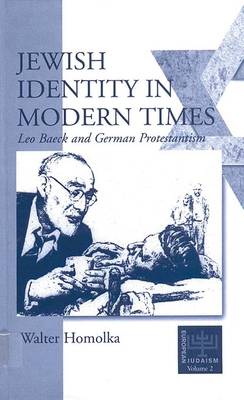
- Afhalen na 1 uur in een winkel met voorraad
- Gratis thuislevering in België
- Ruim aanbod met 7 miljoen producten
- Afhalen na 1 uur in een winkel met voorraad
- Gratis thuislevering in België
- Ruim aanbod met 7 miljoen producten
Jewish Identity in Modern Times
Leo Baeck and German Protestantism
Homolka Walter, Albert H FriedlanderOmschrijving
There is no doubt about Baeck's contribution to Jewish theology in the twentieth century: it has been significant. Without ever departing completely from the ancient wellsprings of orthodoxy, he was a studious observer of the intellectual currents of his time and ambience; under theinfluence of liberal Jewish theology, he drew on and reworked those currents, weaving them into his own theological thought. A special aspect of Baeck's work is that he remained in critical confrontation with Christianity throughout his life, acting as a kind of builder of bridges between the two faiths." (From the Introduction.) It is on this aspect that the author focuses his study inwhich he examines Leo Baeck's critical evaluation of Martin Luther and Protestantism. At the same time Homolka shows how close the intellectual links between liberal Christian and liberal Jewish theology had become before the Holocaust: both sides attempted a new definition of the "essence" of their faiths and were searching for a new identity in an increasingly pluralistic and secular society.
Specificaties
Betrokkenen
- Auteur(s):
- Uitgeverij:
Inhoud
- Aantal bladzijden:
- 150
- Taal:
- Engels
- Reeks:
- Reeksnummer:
- nr. 2
Eigenschappen
- Productcode (EAN):
- 9781571810595
- Verschijningsdatum:
- 1/10/1995
- Uitvoering:
- Hardcover
- Formaat:
- Genaaid
- Afmetingen:
- 152 mm x 229 mm
- Gewicht:
- 394 g

Alleen bij Standaard Boekhandel
Beoordelingen
We publiceren alleen reviews die voldoen aan de voorwaarden voor reviews. Bekijk onze voorwaarden voor reviews.












